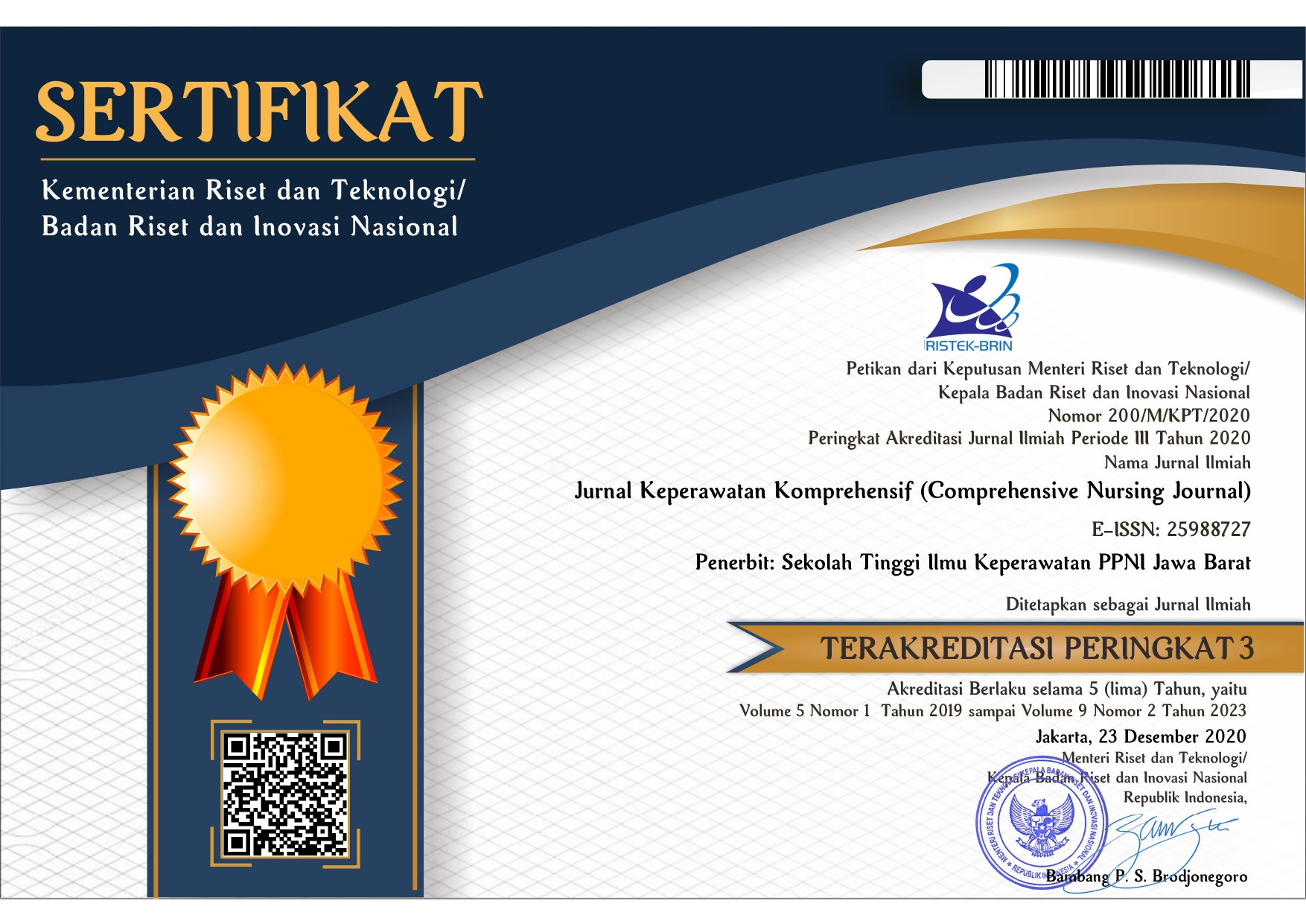The Effect of Health Promotion Using E-Health Versus Lecture Toward Knowledge of Personal Hygiene Among Junior High School Students in Banten
DOI:
https://doi.org/10.33755/jkk.v10i4.731Keywords:
E-Health Method, Health, Knowledge, Lecture Method, Personal Hygiene, PromotionAbstract
Aims: Knowing the effectiveness of health promotion between the e-health method and the lecture method on knowledge of personal hygiene external genitalia in junior high school students at Pondok Pesantren Latansa Lebak Banten.
Method: The study involved 84 female students at SMP Pondok Pesantren Latansa Lebak Banten, using a quasi-experimental design, pretest-posttest, and control group design.
Result: The results of univariate research on personal hygiene knowledge of external genitalia with health promotion e-health method obtained before that most were sufficient 47.6% and after most were good 71.4%. Knowledge of external genitalia personal hygiene with the lecture method health promotion was obtained before most of it was 50.0% and after most it was enough 52.4%. The bivariate results of the paired simple t test were 0.000 and the independent t test obtained a p value = 0.003.
Conclusion: The e-health method is more effective in promoting knowledge of external genitalia personal hygiene among junior high school students than lecture methods, and cooperation with health workers is hoped to improve female students' hygiene practices
References
Ganong, Wiliam F. Medical Physiology. Jakarta: BookPublisher; 2019.
Heffner LJ, Schust LJ. A Glance at the Reproductive System. Erlangga; 2019.
Kasdu D. Solusi problem wanita dewasa. Niaga Swadaya; 2005.
WHO. Guideline : calcium supplementation in pregnant women. 2021;
Wahyuni, Sri, Soelistyowati E. Hubungan Kebersihan Diri dengan Kejadian Keputihan pada Remaja Putri di SMA Dharma Wanita 4 Taman Sidoarjo. . Jurnal Keperawatan. 2021;
Nurul, Qomariyah. . (2021). Infeksi Saluran Reproduksi (ISPA) pada Wanita Indonesia. 2021.
Ministry of Health of the Republic of Indonesia. Health Profile of Indonesia. Ministry of Health Indonesia. 2022;
Dinas Kesehatan Provinsi Banten. Profil Kesehatan Provinsi Banten 2021. Dinas Kesehatan Provinsi Banten. 2022;
Aulia. Serangan Penyakit Khas Wanita yang Paling Sering Terjadi. bluebook; 2020.
Baradero. Klien Gangguan Sistem Reproduksi dan Seksualitas. EGC; 2019.
Susanti. Pemberian Stimulasi Dan Perkembangan Motorik Anak Usia 1-3 Tahun Di Kelurahan Krembangan Kecamatan Morokrembangan Surabaya. Jurnal Ners LENTERA. 2016;
Kumalasari I, Andhyantoro I. Kesehatan reproduksi untuk mahasiswa kebidanan dan keperawatan. Jakarta: Salemba Medika. 2012;14:22.
Maulana, Heri. Promosi Kesehatan. EGC; 2019.
Adi S. binus. 2019. Medical E-Health.
Sri Yuhandini D, Widiyastuti D. PERAN PENDIDIKAN KESEHATAN DENGAN MEDIA LEAFLET DAN AUDIO VISUAL (VIDEO) TERHADAP PENGETAHUAN SUAMI TENTANG TANDA BAHAYA PADA KEHAMILAN DAN NIFAS TAHUN 2017. Jurnal of Maternity of care and Reproductive Health. 2021;4(2):178–93.
Wawan A, Dewi M. Teori dan pengukuran pengetahuan, sikap dan perilaku manusia. Yogyakarta: Nuha Medika. 2010;12.
Alin. Health Behavior Concept. 2020;
Susilowati D, Susilowati D. Promosi kesehatan. 2016;
Dharmalingam T, Kamaluddin M, Hassan S, Zaini R. The needs of Malaysian family members of critically ill patients treated in intensive care unit, Hospital Universiti Sains Malaysia. Malaysian Journal of Medicine and Health Sciences. 2016;12(2):9–17.
Notoatmodjo S. Pendidikan dan Perilaku Kesehatan. 2020.
Health of the Republic of Indonesia. Indonesian Health Profile 2019. In Ministry of Health of the Republic of Indonesia. In: Ministry of Health of the Republic of Indonesia. 4th ed. 2019.
Jamil M, Khairan A, Fuad A. Implementasi aplikasi telemedicine berbasis jejaring sosial dengan pemanfaatan teknologi cloud computing. JEPIN (Jurnal Edukasi dan Penelitian Informatika). 2015;1(1).








